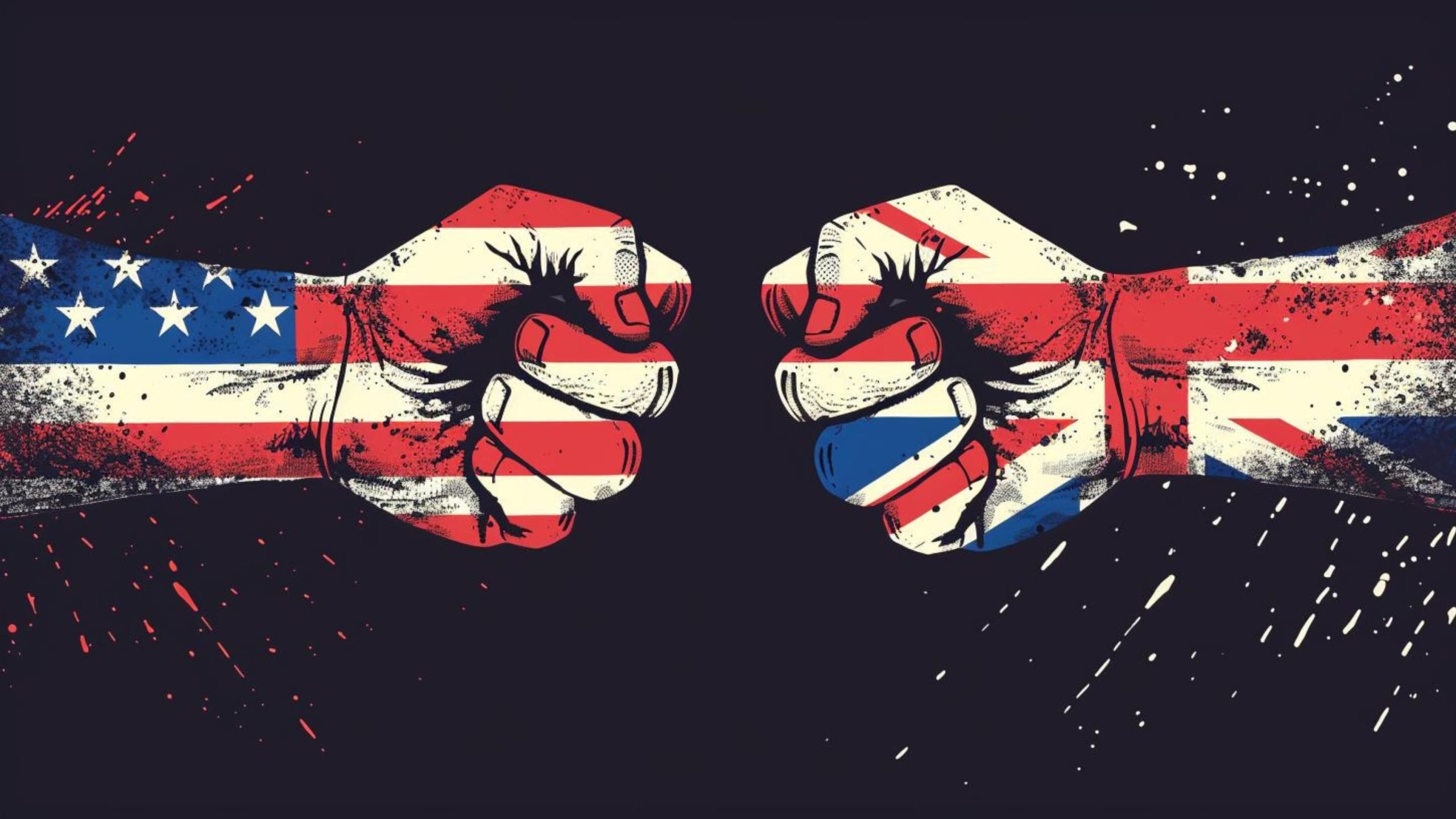America First Legal (AFL) has pulled back the curtain on yet another government meeting that makes “free speech” sound like some quaint idea from the past. AFL has released documents from a 2021 interagency get-together where the UK’s top experts on “disinformation” offered a master class in censorship, all under the guise of “protecting democracy.” And because nothing screams transparency quite like a secret strategy session on silencing opposing voices, the revelations come with just a hint of irony.
On August 10, 2021, the Biden-Harris National Security Council (NSC) hosted a cozy little chat with the United Kingdom’s “Counter Disinformation Unit” (CDU). The occasion? An instructional session on how to manage—read: censor—COVID-related speech in the US. But why stop at the pandemic when there’s so much more to control? This wasn’t just about virus talk; it was a step-by-step guide on how to choke off the flow of any inconvenient truth that might muddy the government’s preferred narrative.
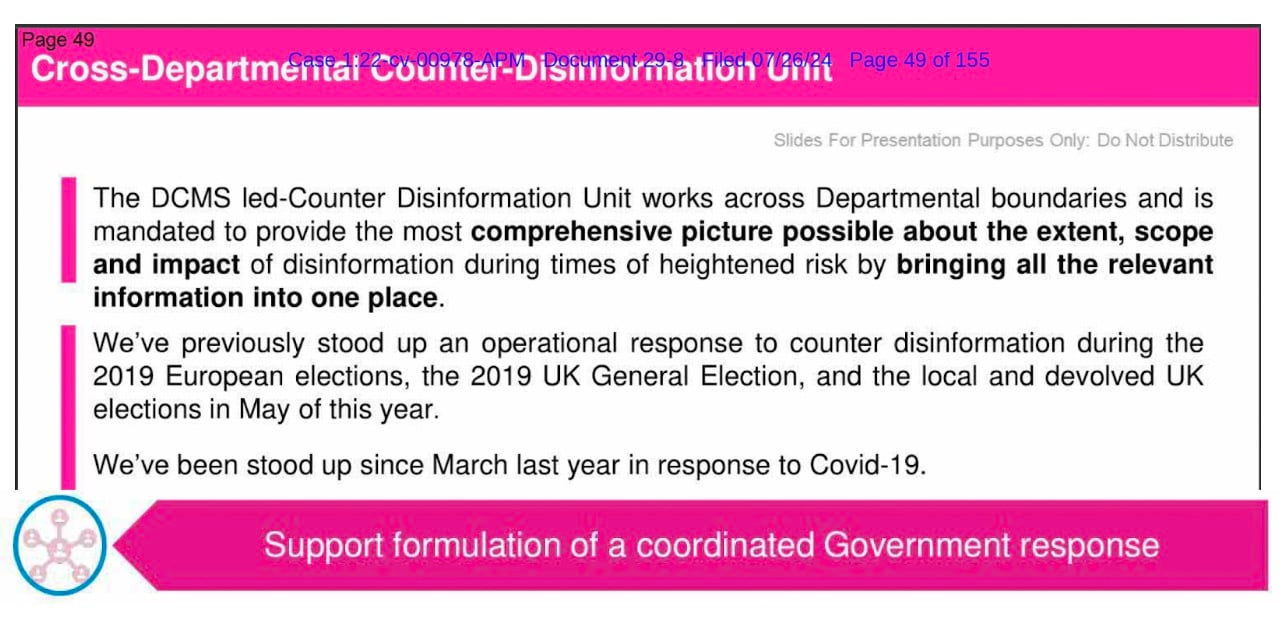
We obtained a copy of the documents for you here.
The slide deck AFL obtained from its litigation against the CDC offers a glimpse into how keen the US government was to import a few censorship tips from its UK friends. The CDU wasn’t shy about sharing its best tactics and judging by the meeting’s outcomes, the Biden administration was more than happy to take notes. When it comes to controlling what people say, why not learn from the pros?
The Censorship Playbook
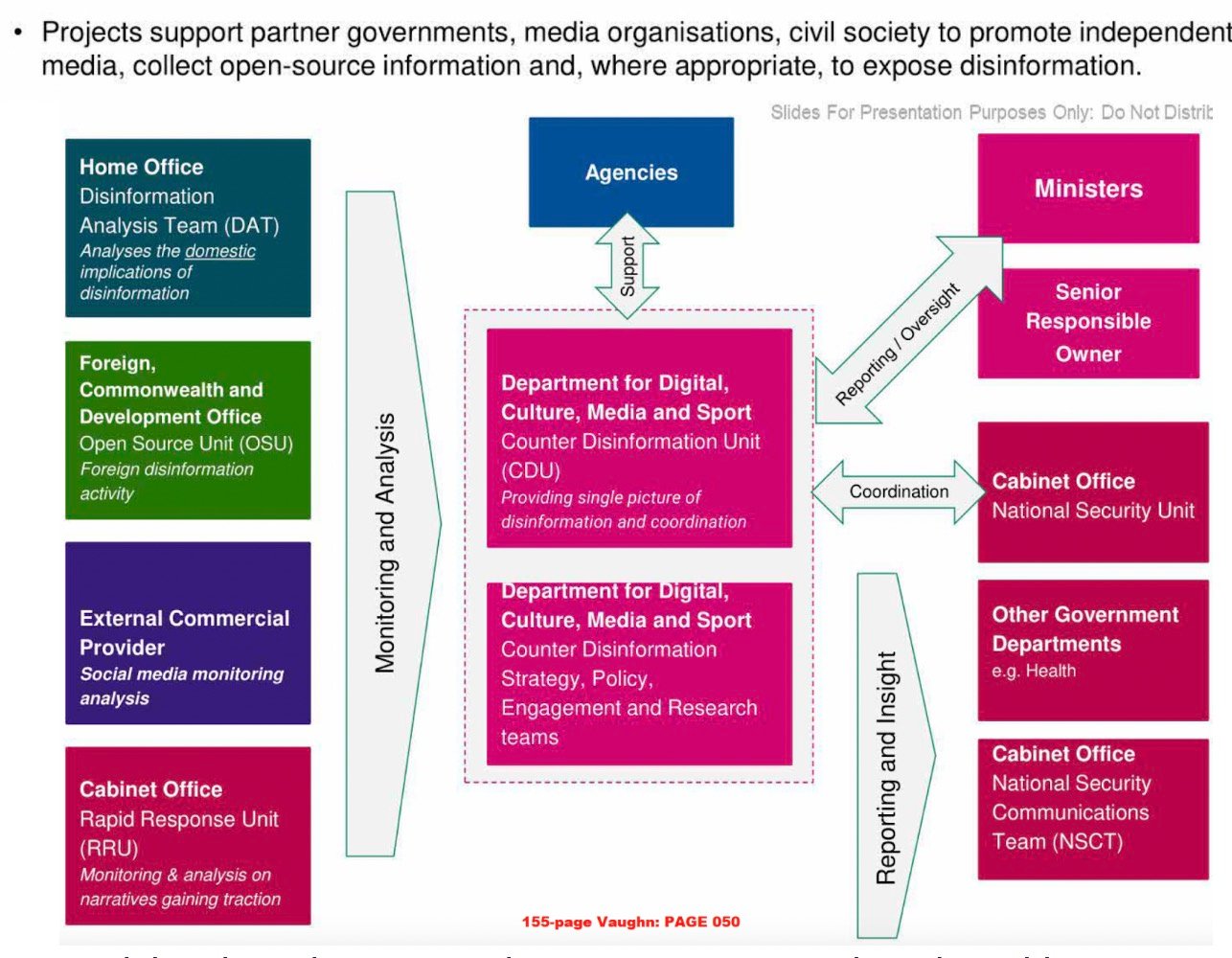
Here’s what the CDU was pushing during that presentation, and what the US government was apparently eager to explore:
1. A Government-Led Censorship Unit: First order of business? Set up a dedicated task force to oversee censorship across the government. You can’t leave this stuff to chance. A coordinated effort is much more efficient when it comes to silencing unwanted speech.
2. Legislation to Regulate Tech Companies: The next move was all about turning up the heat on tech companies. The CDU advised the US to push for laws that would force social media platforms to regulate speech, with harsh penalties for those who didn’t comply. Basically, get them to do the government’s dirty work or face consequences.
3. Partnerships with Tech Giants: Why stop at regulation when you can partner up? The UK’s suggestion was to build close relationships with tech companies, getting them to “flag” any content the government found disagreeable. It’s always easier to silence dissent when you’ve got Big Tech doing it for you.
4. Global Cooperation on Censorship: This wasn’t just a domestic agenda. The CDU recommended that the US coordinate with other governments and international bodies to create a global network of censorship. Because if everyone’s in on the same scheme, it’s a lot harder for the truth to sneak through.
5. Control the Narrative on Social Media: The real goal? Not just to stop misinformation but to ensure that only the approved version of events gets amplified. The CDU’s advice: leverage social media to push the “correct” message. This wasn’t about letting the public make up their own minds; it was about making sure they never got the chance.
A Pandemic of Irony
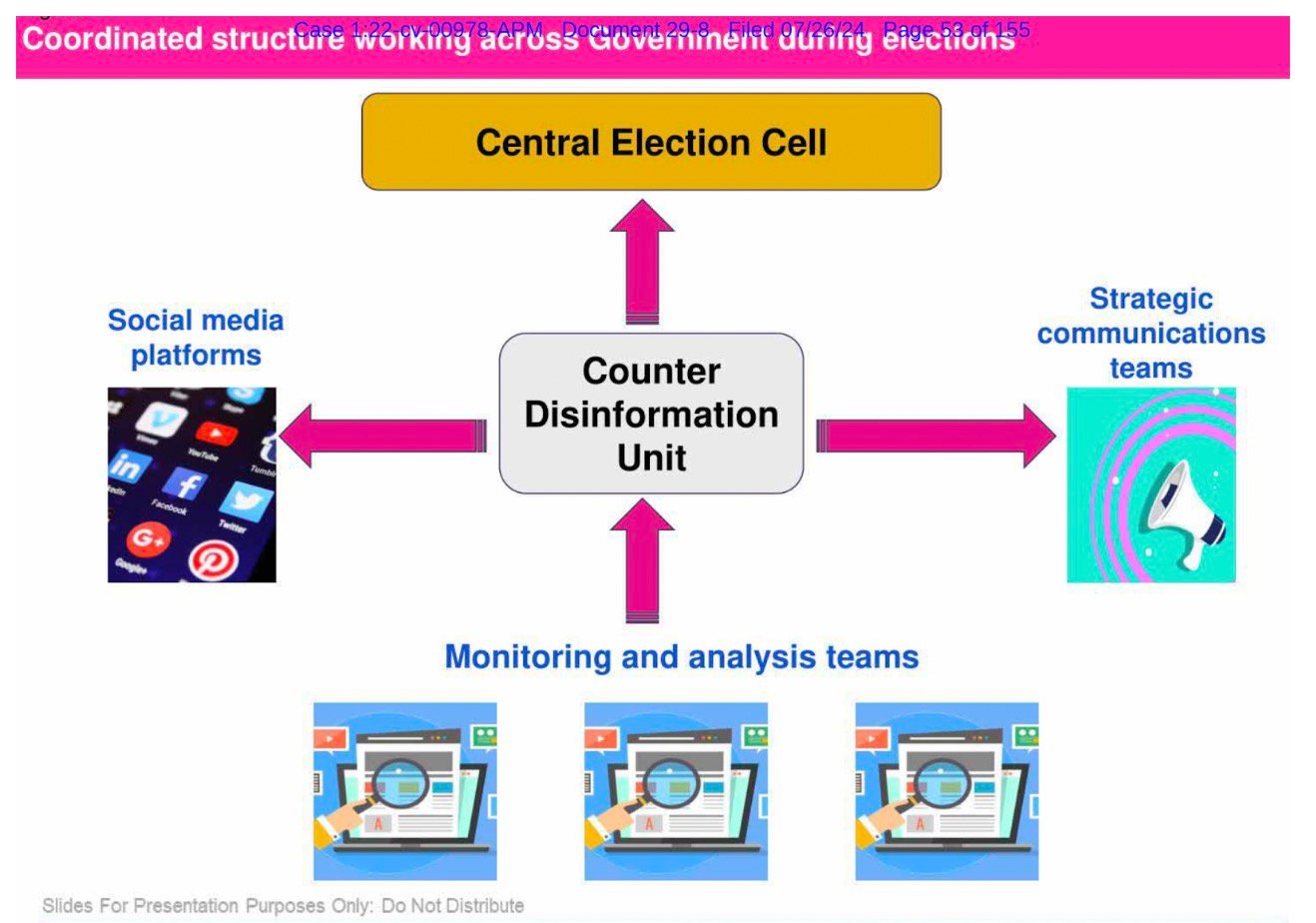
The CDU laid out how they’ve been censoring the British public, piece by piece. Their censorship model was no amateur operation—it was a coordinated effort to suppress anything the government found disagreeable, all under the guise of fighting “misinformation.” The Biden-Harris National Security Council (NSC), not wanting to miss out on the fun, welcomed this information with open arms. They were eager to learn from their British friends and figure out how to impose these tactics back home. After all, why reinvent the wheel when you can just copy someone else’s authoritarian playbook?
The Government-Wide Censorship Hub
The CDU has been busy over in the UK, working as a cross-departmental censorship machine, connecting the dots between private companies, social media platforms, and non-profits to control what the public sees and hears. This unit isn’t just some random bureaucratic office—it includes components of the UK’s intelligence services, foreign policy apparatus, and individuals directly linked to the Prime Minister’s National Security Unit. So when they suggest the US create a centralized hub to lead its own censorship program, the recommendation carries a certain weight. The idea is simple: a one-stop shop for squashing speech the government doesn’t like.
And of course, they’ve partnered with private companies to flag content that challenges the state-approved narrative. This cozy arrangement is made to look like cooperation, but it’s really just government pressure disguised as a “partnership.” When the government controls the narrative, dissenting voices don’t stand a chance.
Legislation to Keep Big Tech in Line
One of the key points of this meeting was the CDU’s recommendation that governments pass legislation to coerce social media companies into submission. Why just nudge platforms to censor speech when you can force them by law? The British approach has been to legislate the boundaries of free speech, giving them the power to punish companies that refuse to toe the line. It’s the government’s way of ensuring that no rogue tech CEO suddenly gets a conscience and decides to protect the public’s right to speak freely.
The Biden-Harris administration was more than willing to listen. It wasn’t enough to pressure Big Tech behind closed doors—they were looking for a legal framework that would guarantee compliance. What the CDU laid out was the path to making sure the platforms did what they were told, or else. This wasn’t about protecting public safety, but about controlling the flow of information at all costs.
Global Censorship: A Team Effort
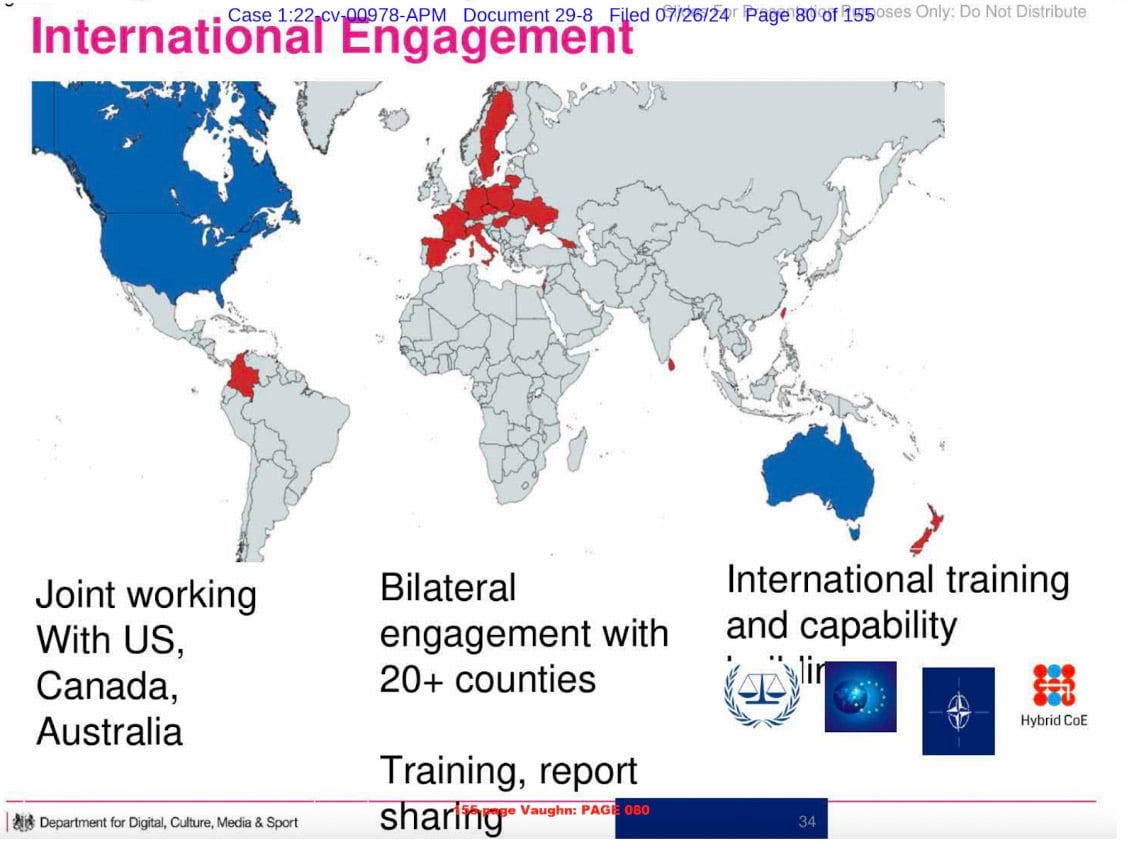
Why stop at national censorship when you can take it global? The CDU emphasized the importance of coordinating censorship efforts internationally. After all, what good is a tightly controlled narrative in the US if your citizens can just hop online and hear what’s happening from someone in another country? The solution? Work with foreign allies and multilateral institutions to keep the story straight around the world. A global censorship agenda ensures that pesky facts don’t slip through the cracks, no matter where they originate.
The US Department of State was ready to jump in on this, with the Biden-Harris administration eager to align with like-minded governments. It’s all part of an international push to keep information flowing just one way—from the top down.
Election Time: Censorship on Overdrive
It’s no surprise that election time is when the censorship machine really kicks into high gear. Around this period, the CDU stood up its “Central Election Cell,” an ominous-sounding office dedicated to ramping up suppression efforts. The idea was to make sure the wrong people didn’t get heard at the wrong time. The US took careful note of this strategy, preparing to hit the censorship button even harder when it matters most.
And as AFL’s separate litigation has uncovered, these public-private partnerships between the government and tech companies have continued to evolve. The Biden administration carried on with its own version of a censorship alliance well into 2024, a web of control that was spun to keep the public in check.
Take, for example, the Homeland Intelligence Experts Group. If the name sounds creepy, it’s because it is. This was another outfit AFL managed to bring down in court—an Orwellian experiment where political dissent, especially from Trump supporters, was rebranded as “domestic terrorism threats.” With this group dissolved, it’s clear AFL is keeping a close watch, but that doesn’t mean the gears of government censorship have stopped turning.
The Real Threat to Free Speech
The documents from this 2021 meeting pull back the curtain on how left-wing governments across the globe are working hand-in-hand to suppress free speech. The idea that this is about stopping misinformation is the excuse they give, but the reality is much darker. This is about power—keeping the public’s access to information tightly controlled and making sure that the “wrong” ideas never gain traction.
This UK initiative has already borne real-world consequences. In October 2023, the UK Online Safety Act came into force, allowing British officials to threaten legal action—including the extradition and jailing of US citizens—if their social media activity runs afoul of UK censorship standards. It’s a bold, if not absurd, attempt to extend British censorship across the Atlantic.
Meanwhile, over in the US, there’s a familiar ring to all this. Back in 2019, then-Senator Kamala Harris was already calling for the Department of Justice (DOJ) to come down hard on social media companies that allowed “disinformation” and “misinformation.” It’s no coincidence that now, as Vice President, those ideas are coming full circle.
A Transatlantic Censorship Alliance
A separate investigation by AFL revealed that the Biden-Harris administration has been taking notes from the British censorship playbook for some time. Specifically, the administration solicited policy recommendations from the Center for Countering Digital Hate (CCDH), the same group that helped lay the foundation for the UK’s Online Safety Act. Not content to just slap fines on tech companies, the White House has explored using DOJ prosecutions and Federal Trade Commission (FTC) enforcement actions to punish platforms that fail to sufficiently censor “online harassment.” Translation? If the companies don’t play ball, the government will bring out the legal hammers.
Part of the CDU’s plan involves establishing regular lines of communication between governments and social media platforms. In other words, governments direct platforms on what to censor. This is more than just a suggestion—these are “trusted flagging relationships.” When the government flags a post, the platform is expected to act. It was this very behavior that led AFL to file the lawsuit that has now exposed these documents. The infamous “trusted relationship” setup was alive and well in the Biden-Harris administration long before this meeting even took place. Prior releases from AFL’s litigation against the CDC and the NSC confirmed that the administration had already been cozying up to Big Tech, with a clear goal: silence dissenting voices before they gain traction.
Global Pressure, Coordinated Censorship
The CDU’s strategy wasn’t limited to pushing domestic censorship; they were actively exporting it. The UK Foreign Office engaged its foreign policy apparatus to help nudge other countries into adopting similar censorship tactics, and it encouraged the US to do the same. This approach wasn’t just about handling misinformation within borders—it was about uniting governments to put collective pressure on platforms worldwide.
According to the CDU, one of the “significant benefits” of this international approach is that it would encourage cooperation from platforms more easily. The underlying message? When governments around the world are all leaning on Big Tech to enforce the same censorship policies, it becomes much harder for companies to resist. The US Department of State, apparently a willing participant, mirrored the UK’s efforts by playing its own role in this global censorship orchestra.
In fact, the UK proudly touted its close working relationship with the US, Australia, Canada, and a growing number of other countries. By 2021, the CDU had bilateral relationships with 20 additional nations, raising the question: how many more governments have joined this international censorship alliance since then? It’s clear that this isn’t just a domestic issue—it’s a full-scale global effort to control information flows. In response, AFL has launched investigations into whether the Biden-Harris administration’s Department of State has been leaning on platforms like Telegram and X (formerly Twitter) for refusing to toe the censorship line.
Censorship Through Multilateral Channels
The CDU’s presentation didn’t just highlight direct government intervention but also emphasized the role of multilateral institutions in pushing the global censorship agenda. They pointed to platforms like the G7’s Rapid Response Mechanism and the United Nations’ Interagency Platform on Culture for Sustainable Development (IPCSD) as key tools for uniting governments in the fight against “disinformation.” But what does “disinformation” really mean in this context? It’s whatever these governments want it to mean—conveniently flexible to serve political purposes.
Logos of major international institutions like NATO, the International Criminal Court (ICC), and the European Center for Excellence of Countering Threats flashed up under the CDU’s heading “International training and capability.” These aren’t just bit players in the game; these are some of the biggest, most powerful organizations in the world. Their involvement in this coordinated censorship effort makes one thing clear: this isn’t about protecting people from fake news—it’s about solidifying government control over the global narrative.
The Rising Tide of Authoritarianism
This latest batch of documents reveals a troubling trend. What started as a government push to counter supposed misinformation during the pandemic has spiraled into a global movement to control speech on an unprecedented scale. By working in lockstep with international allies and multilateral institutions, the Biden-Harris administration, alongside other left-wing authoritarian governments, is pushing a narrative that there’s no alternative to censorship. It’s a strategy designed to slowly tighten the reins on free speech, all while claiming it’s for the greater good.
The chilling takeaway is this: as governments and tech companies work closer together, censorship becomes not just a possibility but a well-oiled machine. This international alliance, driven by countries like the UK and enabled by the US, is setting the stage for a future where your right to speak freely is increasingly dependent on whether your speech aligns with what the government deems acceptable. And with bilateral partnerships and multilateral institutions on board, this global censorship movement is showing no signs of slowing down.

